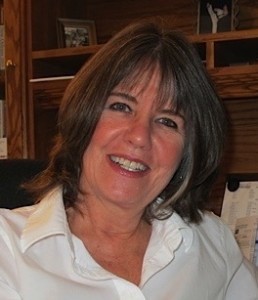 A delayed move to Oregon in her 50s allowed Corie the time to finally write her first novel. Little did she know it would spark the interest of one of the premier filmmakers in Hollywood, who is now writing the script.
A delayed move to Oregon in her 50s allowed Corie the time to finally write her first novel. Little did she know it would spark the interest of one of the premier filmmakers in Hollywood, who is now writing the script.
Tell us a little about your background…
I’m no stranger to reinvention. I’ve done it several times in my life.
I was born on the south side of Chicago in a post war, blue-collar community of single-family homes with a burgeoning middle class. It was a cliché of the 1950s, an overwhelmingly white neighborhood where very few moms worked outside the home. The ‘60s shaped my teenage years—it was a time when our country experienced major societal upheaval with the civil rights movement and the Vietnam War philosophically dividing families and cultures.

Circa 1955. Corrie is third from left, front row.
The segregation, bigotry, and racism I witnessed growing up on the south side of Chicago—a neighborhood that Dr. King called “the most racist place he’d ever been”—would stay with me and be reflected in my writing.
I went to Southern Illinois University for exactly one quarter. I quit school and came home in 1969 to get married to my high school sweetheart, my first husband. I went back to school in dribs and drabs after we moved to southern California a year later. The marriage didn’t last. I consider my first marriage a casualty of the Vietnam War and of my own immaturity—I was only 18 when we married.
I moved in with friends, worked in advertising, and flirted with the notion of becoming a “real” writer very briefly until I remarried and had a child. That second marriage was also doomed—I had no business getting married to anyone but I was impulsive and on the rebound; that never works well.
After my divorce, advertising seemed an inappropriate career choice for a single mom. I went back to school full time at Cal State University-Northridge (CSUN) to get my Bachelor’s degree, then completed graduate studies in psychology at Cal State-Fullerton. I finished in 1985 and got my clinical license as a Marriage and Family Therapist in 1989, at the age of 39.
Delaying my education forced me to focus and really value the process. I was a very poor student at 18; by the time I went back full time at 31, I was highly motivated. I graduated with my BA Summa Cum Laude and was recognized as the Outstanding Senior in the Psychology Department. While in school, I met my third husband —Pablo, a keeper—and I had a second child.
What followed was a lengthy period of stability. I worked as a therapist in private practice and taught part-time as an adjunct professor of psychology for more than 20 years while raising my two kids. I did a ton of pro bono work with a whole range of nonprofit organizations. I volunteered with AIDS Project Los Angeles for many years and supervised interns for one of LA’s largest high-risk youth agencies, New Directions For Youth.
Once I left my blue-collar origins, got a formal education, and worked with many disadvantaged communities, I became a “bleeding heart liberal.” I had grown up in an extremely conservative environment. My parents had limited formal education and were not sophisticated readers. They had a very simple grasp on social structure and human behavior and were very vulnerable to “us vs. them” thinking. They identified as conservative as a rejection of what was alien and unknown to them. For instance, my mother (a strict Lutheran) was fearful of Catholicism; she grasped onto the Republican Party mostly out of a fear that Catholics would “take over America” and the Pope would “control the U.S. government.” I know that sounds ridiculous but that’s how I remember her understanding of politics.
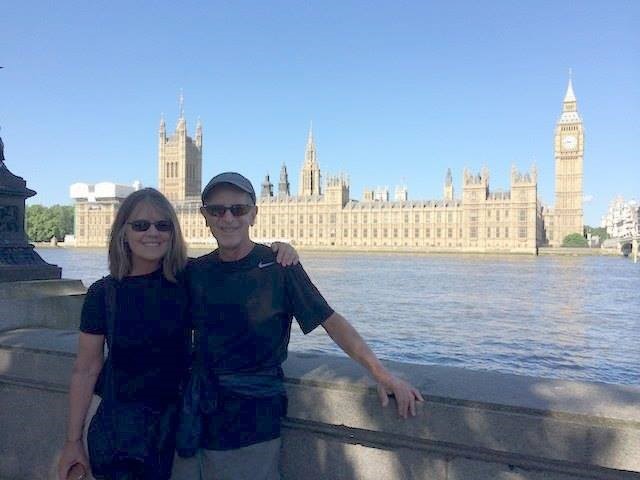
With Pablo in London last year
When did you start to think about making a change?
I always thought that I’d find the time and the opportunity to write something substantial eventually. I maintained the dream of returning to fiction, at least as a hobby. My former students will tell you that my syllabi were very “creative.”
I saw a lot of my peers hesitate to retire because of the loss of identity as a professional. And I saw a lot of colleagues who did retire indeed regret losing the way they defined their roles in society or among their family and friends. It is so difficult to go from feeling admired for the work you do to having no work at all and no interface with people who appreciate your value. Seeing some friends go through this made me realize that before I retired from my “day job,” I’d better have a plan.
Was there some event that precipitated a change?
In 2006, when I was 56, Pablo and I decided to retire together to Portland, where our daughter was living. I did everything necessary to leave LA: I turned my private practice over to my young partner; I quit teaching; I even started looking into volunteer work in Portland.
Then Pablo decided to work another year or two. I have to admit, I freaked a little. I didn’t think it would be fair to start a volunteer gig in LA if I couldn’t commit to a reasonable stretch of time. But I didn’t want to be an idle “lady who lunches” either—I’d worked since I was 11 years old. It was an authentic identity crisis. Pablo called me out and challenged me to put up or shut up—I’d been talking about writing a novel since forever.
What is your next act?
I am a novelist. My first book, Orfan, tells the story of JD, who finds himself alone when his adoptive parents both die before his fifth birthday. He’s left in the care of his bigoted adoptive grandmother, which is no care at all. He survives by “getting a little help from his friends.” I really see it as a kind of lesson in human relations and the evils of racism. The principle premise of Orfan is this: If we let it, music heals us. Art and especially literature teach us and soothe us. And love transcends everything else.
I think that the story behind Orfan had to be told. I really needed to write that book as a teacher and a therapist. I honestly think it isn’t a great book—I don’t have the writing skills to write a great book—but I think it is a great story and it will make a great movie. I think it touches hearts and minds.

James Dean is a character in Orfan. Last year Corie went back to his hometown.
What was your inspiration for Orfan?
It came from many sources, beginning with my experience as a kid on the south side of Chicago. The year before Dr. King was assassinated in Memphis, he came to my neighborhood to protest unfair housing practices. He was quite literally stoned by people who showed up to prevent the protest. That period marked a personal transformation. As part of the “white” culture on the south side, I’d been taught to be protective of “our” neighborhood. When I witnessed people attacking peaceful protesters, I was appalled. It was a real awakening for me.
Then, when I was teaching a course at CSUN called “The Psychological Aspects of Parenthood,” I had the panel from Concerned United Birthparents speak to my classes. One of the birth moms told her story of being a pregnant teenager who gave birth to a bi-racial child. Her mother coerced her into relinquishing the baby. In Orfan, I wanted to make a statement about the hypocrisy of claiming “family values” while our institutions destroy families and individuals by marginalizing them and marking them as “inferior.”
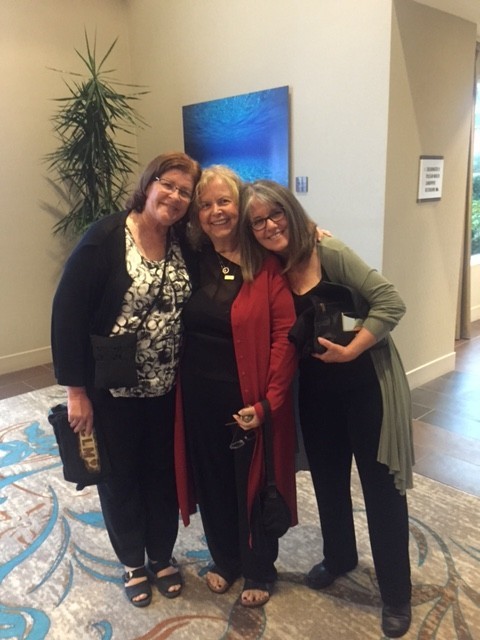
With Mimi Janes, Karen Vedder, who both gave Corrie notes on the Orfan Prologue to authenticate the experience of young girls in the sixties who had to relinquish their babies
How hard was it to get Orfan published?
My publisher found me! While I was sending out agent queries, Paige Gold, an attorney who represents mostly documentarians, approached me with an early offer to try to develop the book into a movie. She was a friend of a friend from graduate school. She wanted to try to get a book-to-film deal with Orfan but she was convinced that it had to be published first by a “Big Five” publisher. She tried for a year to find a top-notch literary agent using her connections but nothing panned out.
In 2009, I visited my son, Jake, a graduate student at NYU in the Music Industry Business masters program who was also running the recording studio there. When he and a friend told me they would start a book imprint if I let them make an audiobook out of my manuscript, I agreed. I didn’t want to waste more time on the agent query process when I got that offer! I didn’t really care at all about the prestige of a “traditional publisher.” Orfan was published in 2010, when I was 60, by Mannequin Vanity Publishing. So I can say that my publisher is my son! I think the word “nepotism” applies—in a good way.
Jake talked me into narrating the audiobook. At first I didn’t want to because I’m not an actor and I don’t like my own voice, but he wanted to save money and he said that people want to hear the author.
Tell us more about working with Mannequin Vanity Publishing.
It’s an arm of Mannequin Vanity Records. The young people there are an inspiration. They believe that anything is possible—the opposite of what our generation was taught. We heard that success in the arts was almost impossible, that the odds were against us. Creative young artists today don’t agree with that. They insist that your work should be what you love to do and that anybody with a story and the initiative to finish a written product can publish. They fear nothing.
The 20- and 30-somethings at Mannequin don’t have traditional job descriptions or real offices. They don’t believe in a Monday-Friday 9-5, workweek; they come and go as needed. It’s 90% virtual. Everyone is talented and artsy and many do more than one thing. It’s huge fun to be on the periphery of that kind of working environment. I cherish the opportunity to see the world through these fresh young eyes. They are the future.
Mannequin’s business model is unique. For example, the record label never owns the artists’ music; artists retain all creative control along with their rights. I think it’s because Jake is a musician himself (he has his own band Quel Bordel); he’s very pro-artist.
Artistic inquiries should be sent to Mannequin Vanity Records via email (mannequinvanityrecords@gmail.com) after taking a look at their website; musicians should send links to their Youtube videos and websites. Judy Campbell Smith is the licensing agent for the label and the Editor at India Street Press; she also designed the book cover and cover art for America’s Most Eligible. She can be reached via email at judy@mannequinvanityrecords.com.
It sounds like there are more exciting plans for Orfan…
 Yes! Last year, a friend of a friend, Leslie Paonessa, called me up out of the blue and told me that she’d been given my book and wanted to try to develop it into a movie. Leslie, who is a script consultant, told me that she’d had the book on her nightstand for three years and, when she finally read it, her first thought was, “Ron Shelton would make a great movie out of this book.” I figured I had nothing to lose, so I agreed to pursue it.
Yes! Last year, a friend of a friend, Leslie Paonessa, called me up out of the blue and told me that she’d been given my book and wanted to try to develop it into a movie. Leslie, who is a script consultant, told me that she’d had the book on her nightstand for three years and, when she finally read it, her first thought was, “Ron Shelton would make a great movie out of this book.” I figured I had nothing to lose, so I agreed to pursue it.
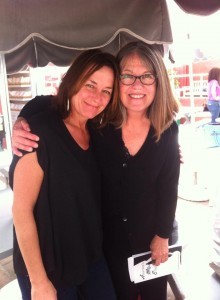
With Kellie Davis of Ron Shelton Pictures
Leslie gave the book to Kellie Davis, who produced the movie Tin Cup and works for Ron Shelton Pictures. Kellie loved it too, agreed that Ron should read it, then sat on it for more than six months because their schedule was so crazy. When Ron and I finally had lunch to discuss the option, he told me, “I didn’t want to read it because I didn’t want to like it. I’m so busy with other projects. And, I didn’t like it. I loved it.” That was pretty heady considering that his Academy Award nominated film, Bull Durham, is one of my favorite movies of all time.
In August of last year, I signed the option contract. Ron is finalizing the adaptation to script as I write this and also plans to direct and produce the movie.
Seeing my work truly cherished by one of the best filmmakers in Hollywood is a dream come true. I’ve been told that sometimes the author of the original work is dismissed after a film option is signed. Book authors can be problematic if they get too opinionated about the way their work gets adapted. I got lucky. My producers (and oh, how I love to say that!) have been inviting; I try to be low maintenance so I don’t lose that privilege.
It is true that only about one third of the books that get optioned ever see film, but since someone like Ron Shelton is adapting the book into a script himself, instead of hiring some young lackey to do it, he must be pretty serious about making the movie.
You went on to write a second novel. Tell us about that one…
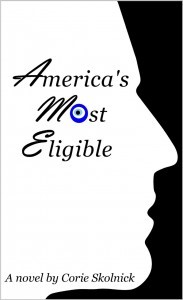 America’s Most Eligible came out last month under a different imprint of Mannequin Vanity Records, India Street Press. (Mannequin established this new imprint to attract readers who might be dismissive of fiction published by a record label.)
America’s Most Eligible came out last month under a different imprint of Mannequin Vanity Records, India Street Press. (Mannequin established this new imprint to attract readers who might be dismissive of fiction published by a record label.)
America’s Most Eligible is a satire about the writing life and the publishing world. It is “experimental fiction” in the sense that the setup is unique—not chapters but “rules” from the narrator’s mentor, a quirky, Pulitzer Prize winner who is the new Chair of the Creative Writing program at UC Davis, where Athena goes to get her MFA. Athena Cervantes is a would-be novelist working at a day job as a feature writer. This book is much lighter and funnier but still has an important message behind it about the futility of war and the power of creativity—very different themes, you might say, but a lot of fun to try to blend into a story about family dysfunction.
How supportive were your family and friends?
For the most part, they have been incredibly supportive. Pablo, my husband, has been my principle patron and most important “beta” reader. If you have someone who is willing to pay your bills while you reinvent yourself as an artist—before you have any kind of reasonable revenue stream—you are very lucky. If you have someone who listens to every word you write and offers constructive criticism when needed, that’s amazing. And if both those things come in a package, you’ve hit the jackpot! Pablo is a very pragmatic guy so he laughed off my wild fantasies of success as an author, saying, “Don’t count on making any money.” When I would fantasize about movie deals, he would just roll his eyes—he doesn’t do that anymore!
The movie deal made a huge difference in how people treated my reinvention. It turns out that it’s one thing to write a novel that remains an obscure vanity project. It’s quite another thing altogether to be validated by a team of renowned moviemakers. I have to say some reactions have been, sadly and curiously, almost hostile. Then again, people I might have predicted would be dismissive of my reinvention efforts have surprised me and even given me credit for inspiring them to make their own changes.
My kids are crazy happy; they both say that I’ve been an inspiration to them. I raised them to believe that they could be artists for their “work.” I always said things like, “do what you love, the money will follow” and “if somebody else is doing what you want to do and getting paid for it, you can too.” Now they’re both successful artists. Jake is 30, runs Mannequin Vanity Records and is the front man for the band Quel Bordel.

Jake performing with his band
Catlin is 37 and is a writer. She’s actually the inspiration for Athena in America’s Most Eligible. She is funny and foul-mouthed and a “real writer” meaning that she actually does have a degree in creative writing (U.C. Davis). She writes Young Adult novels and—this is hilarious—last year she published a book of erotica “for fun” under a pseudonym and sold 26K copies. She literally laughed all the way to the bank. Here is a link to her books and to her Amazon author page.
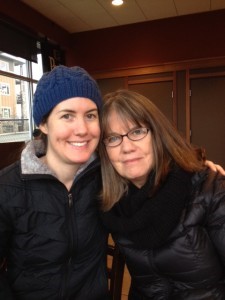
With Catlin
What have you found to be your best ways to market your novels?
In terms of sales, the “best” way is gigs like the Hugh C. Hyde Living Writers Series lecture. The Hyde Series is the longest continuously running lecture series of its kind in the US. They held a big public reading with lots of local press at the Love Library (a gorgeous library at San Diego State). The book was sold at the lecture and the graduate students in the writing program were required to read it.

Author Panel for CUB
Because of my involvement with the adoption community, I’ve been able to tap into that world. I presented with Karen Vedder at the Bi-annual Adoption Conference at St. John’s University in New York—I still get sales from that talk. Concerned United Birth Parents (CUB) invited me to be on an author panel and I sold every book I had with me. Sales dribble in from everything you do. You just never know what’s going to work.
Orfan was recently nominated for the “One City One Book” selection at the Thousand Oaks Public Library. That sells thousands of copies if you get it; I didn’t win but I was up against Lisa Genova, who wrote Still Alice, and others of that caliber, so, not too shabby.
What challenges do you encounter as a novelist?
Time is always a challenge. There’s never enough of it. It takes an enormous amount of time to write a big novel—even a small novel, in the case of America’s Most Eligible. And, the only way to do it is to put in that time.
Marketing is another challenge. You have to do it, though. Even with the “big five” publishers I know that the writer is responsible for promotion to a large degree. Nobody gets to sit back and “get promoted” by their publisher. Everybody has to do the slog—author appearances, book clubs, interviews, and book festivals. Even hugely successful writers like Jane Smiley, T.C. Boyle, and Stephen King have to do it. Nobody gets to be a reluctant shrinking violet in the new publishing milieu. You gotta pimp your books and you gotta do it hard. Otherwise you will slide into obscurity faster than you can say, “Would you please review my book?”
The slog to sell your wares is incessant and, if you’re not a natural born salesperson, it is really, soul crushing. I hate to market. I’d rather do almost anything else. (I couldn’t even sell my two required boxes of Girl Scout cookies back in the day when they only cost 50 cents a box.) I’ve arranged my entire life around never having to sell anything—until now. Now I sell like a boss, because there’s just no alternative. Consequently, every book I sell means the world to me. I wish I could send out a personal thank you note to every single person who buys my books. I am so very grateful.
Reviews are another challenge. If you are an unknown writer, it’s almost impossible to get reviewed by mainstream media reviewers, especially if you are published by a small independent publisher or, God help you, self published. Fortunately, interviews and interviewers are out there and they are often kind and enthusiastic and really helpful in the book slog.

Diesel Bookstore launch party for America’s Most Eligible
Were there times when you thought about giving up?
Yes, of course. I still have days when I feel I’m not having fun anymore. Then something fun happens and I’m back in the game. This interview is a great example. How much fun is this? It’s huge fun. It IS marketing, but it’s the fun kind.
Or, when I feel a little dry as a storyteller, I might read a beautiful book and I just get itchy to write again. (It happened this morning. I read the opening of Lidia Yuknavitch’s new book, The Small Backs of Children: A Novel, and then I wrote the first couple pages of my third novel. I don’t really know how that happens. It just does. I guess that’s why writers like Stephen King start every single writing day by reading another writer’s work.
What did you learn about yourself through your reinvention as a novelist?
So much! Most importantly, I’ve learned to say yes when it would be so easy to say no.
I’ve learned patience. Publishing is so unbearably s-l-o-w.
I’ve learned to take criticism—that sometimes I don’t know what’s best for my characters and someone else might. That’s tough.
I’ve learned a lot about facing my fears and just doing what is necessary to get from A to B even though I might be scared out of my mind. Fear is often a good indication that you are on to something really good. So feel the fear and do it anyway. I learned that nobody will die if I ask them for a book review. And I won’t die if they don’t give me one.
The list goes on and on; hopefully, I will continue to learn until the day they cremate my tattered remains.
What advice do you have for women seeking reinvention in midlife?
My best advice is to surround yourself with other women who are genuinely interested in supporting your reinvention. Avoid all the naysayers and jealous, fearful people who believe that if you succeed in your reinvention, that somehow impacts them in a negative way. Those people are dead weight. Let them go. Don’t listen to people who try to tell you that they know better about “trying” and “failing.” Failures are full of advice and discouragement. Nobody is better at advising people on how to fail than failures. They are almost always bitter and envious of the joy you take in your own process.
Don’t be afraid to try new things—crazy-assed new things are preferable, things that scare you or that your mother would not approve of. You want to be a belly dancer? Go for it. A pole dancer? Even better. You always wanted to act? Try signing up to be an extra. No skills needed but you might just make some connections that will give you information about local acting classes. Be bold.
Don’t be afraid to look foolish because you tried and weren’t an expert at something. Accept that looking foolish is part of “trying new things.” Encourage others in the way that you want to be encouraged. Do not be negative with your self-talk or when you talk to others. Be positive in all your communications.
If you feel unqualified for something you are interested in, consider volunteering in a related capacity first, just to get your feet wet.
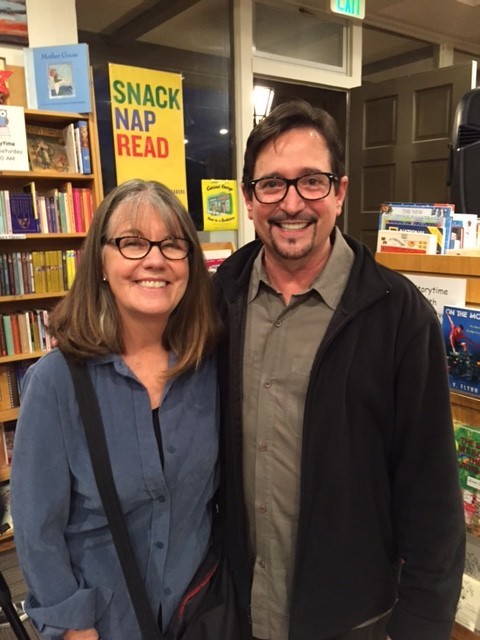
With actor/musician Kevin McNally at the book launch of Orfan in LA
What advice do you have for would-be novelists?
When you decide to be an artist of any kind later in life, there’s less worry about what people will think about you. You just have to be willing to put in the time to create a product, then be willing to risk criticism or rejection. Those are the hard parts. If you get past that, the rest is easy!
Just do it. Sit in the chair, pen in hand or hands on the keyboard. Write. When you have something, find someone to show it to. Don’t be discouraged if they say you suck. Find someone else. Find an arena where other women are meeting up to reinvent themselves. Don’t quit!
I probably didn’t do enough to prepare for a life as a book author before I jumped into it. I wound up learning on the run. I still have a lot to learn and I still actively do things to improve all facets of my life as a book author. I go to workshops. I participate in on-line groups. I take classes when I can and I listen to established writers. And I read! Reading is the most important thing a writer can do to prepare for writing.
What resources do you recommend?
I do have a book to recommend: You-Turn: Changing Direction in Midlife by Nancy Irwin, PsyD. Nancy is a therapist in private practice in Los Angeles whose book describes a bunch of people who have made successful U-turns in life. It’s inspiring.
Check out the site Retire WOW. It has great information on all kinds of practical things people in retirement need to know.
Find places that you can learn about new things. Many communities have local adult education classes; adults are returning to school to re-tool or just have fun in droves! As a psychology professor, I can tell you that I almost always had a number of “re-entry” students in my classes. Some were there to go back and finish up degrees they had abandoned to have a family, and some were there simply for the love of learning. My “re-entry” students were always my favorite.
Use online resources. LinkedIn, Facebook, and other sites will connect you via the search function to whole communities interested in what you want to get info about. LinkedIn just bought Lynda.com and those courses are fabulous.
Research what you want to do and make an investment in a conference or a course or something that gets you moving toward your goal—yes, this might cost some money, but you are so worth it.
I really believe that people have to do their own research. First of all, the world changes at an alarmingly rapid pace. If I do the research for you, chances are my info will be obsolete in a week or two. Sites go dormant constantly. Secondly, I believe that exerting the effort to find resources increases the likelihood you’ll actually take action and do something.
What’s next for you?
Pablo and I are settling in to our new home in Portland. Yes, we finally made the move—nine years later!
 We will continue to work on Desto3, a vanity project where we display Pablo’s photography. We work on the website together when we travel, which we do extensively. We used to send emails with some of Pablo’s best photos to our friends, who were then forwarding them to their friends. The list got quite large so we just set up Desto3 to make it easy to share Pablo’s work.
We will continue to work on Desto3, a vanity project where we display Pablo’s photography. We work on the website together when we travel, which we do extensively. We used to send emails with some of Pablo’s best photos to our friends, who were then forwarding them to their friends. The list got quite large so we just set up Desto3 to make it easy to share Pablo’s work.
I do sometimes think of combining all my experience into something: teaching, counseling, and writing. Maybe running a group for women who need a little support to get started with their own reinvention as writers? We shall see.
And of course, I’m working on my third novel!
Contact Corie Skolnick at corie.skolnick@gmail.com
Website: http://corieskolnick.com
Facebook: https://www.facebook.com/authorcorieskolnick
Twitter: @corieskolnick
Books: Orfan and America’s Most Eligible
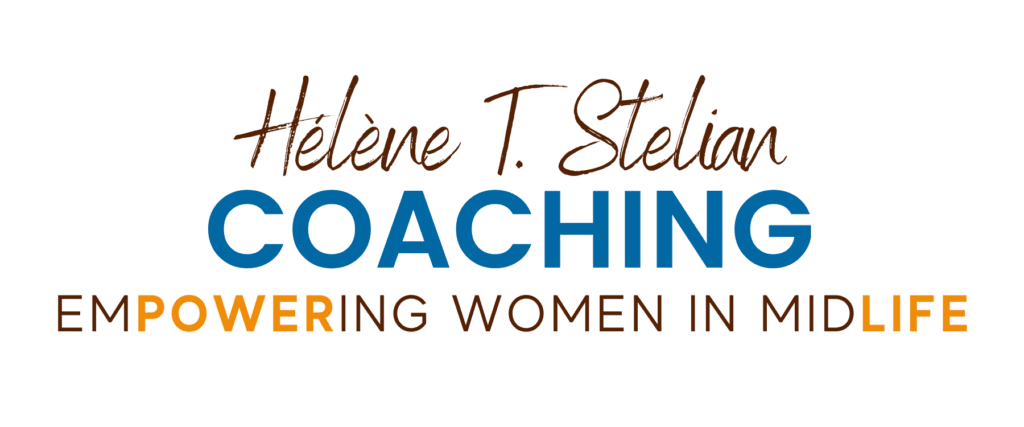

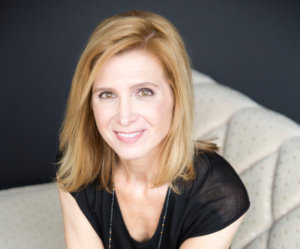
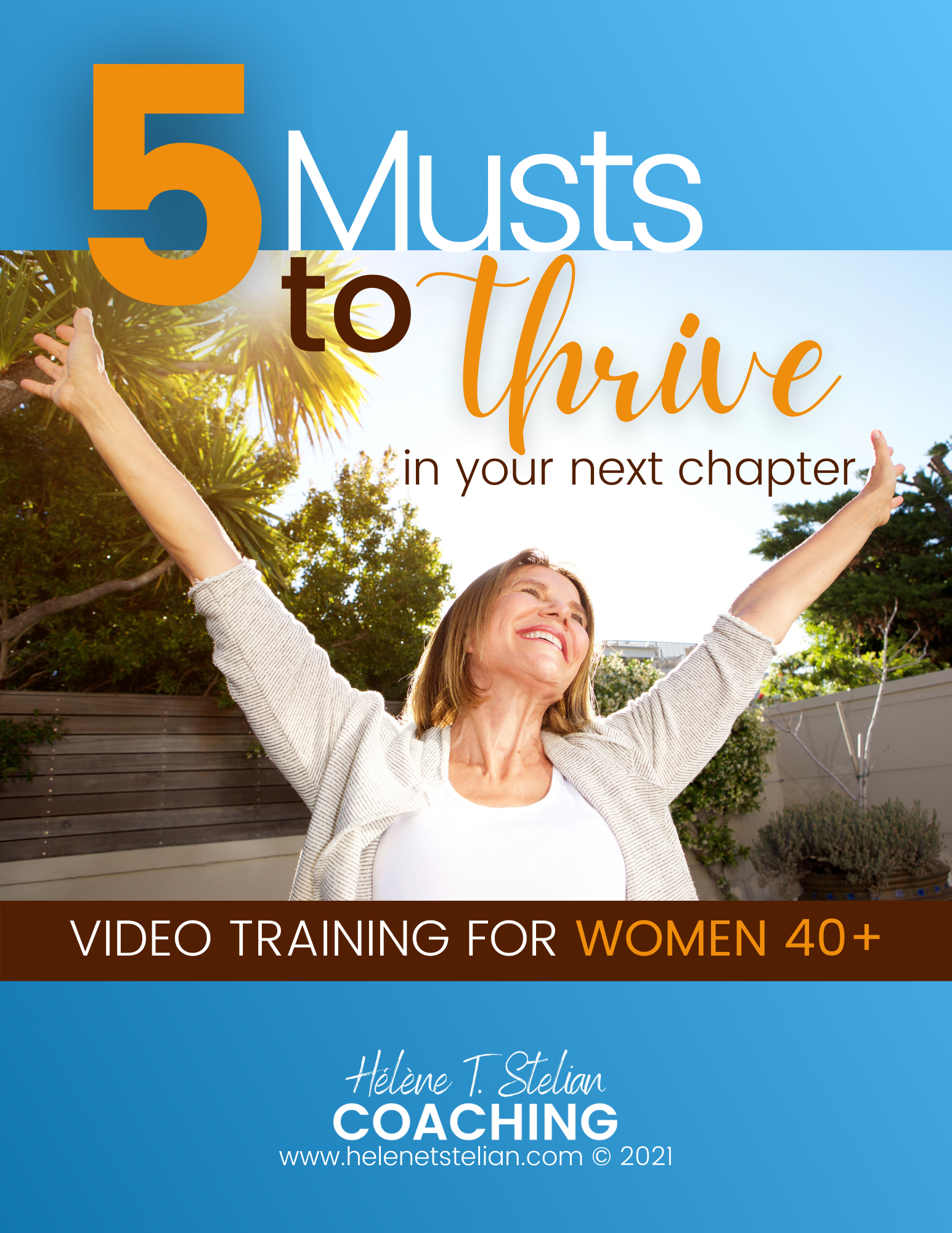



So inspiring! Thank you for sharing your story and wisdom.
Thanks, Laurie. You inspired me and I’m sure many others!
I so enjoyed reading this, Corie. And about this: “I don’t have the writing skills to write a great book.” I respectfully disagree. LOVE your work! (And you.)
Your words spoke to me…..in my “retirement” I was led to UCLA for their intensive 10 month mindfulness meditation program which led me to complete a mindfulness curriculum for K-12 grade students. Exciting to hear of the path you found and look forward to hearing when the movie comes out! I think the Westlake Twin needs to show it!
Janet, a course in mindfulness for kids K-12 will change lives! And then the world. How cool are you?
Corie,
I just now read your story and loved it! You’re so humble and I was captivated
reading your story and your book! I will definitely check out the Desto3 website. The little I did see of Pablo’s photography is very impressive! I was happy to have the opportunity to work with you and your husband, It was a true pleasure. So happy to hear you are settled in Portland.
Looking forward to the movie!
Corie,
Love getting to know you more. What an incredible journey with so many fascinating excursions along the way. You are an inspiration. Your commitment to family…your & others, seems to be at the root of the work you do and what matters most. Wishing you the greatest success. Thank you…
Thank you, Corie, for your inspirational interview. Enjoyed it immensely…Can’t wait to hear more about the debut of Orfan, the movie!